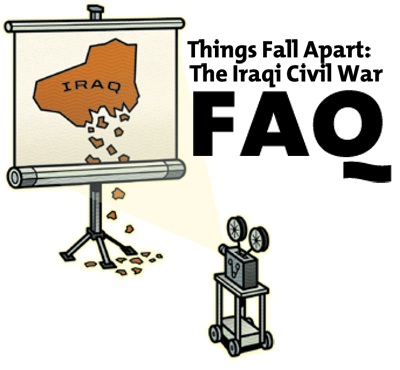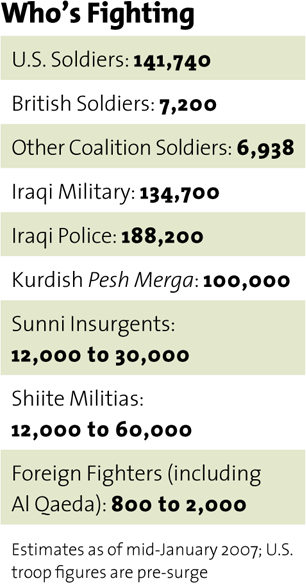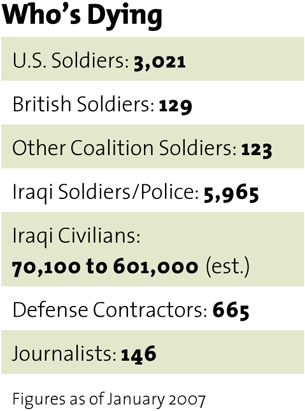Fight disinformation:
Sign up for the free
Mother Jones Daily newsletter and follow the news that matters.


|
Q. How did the fighting start in Iraq?
A. Right
after the American invasion, it seemed that attacks on U.S. troops were
mostly a symptom of general chaos. But by late summer 2003, an organized,
nationalist resistance, led by Baathist officers fired by the U.S. authorities,
had emerged. (The term “insurgents” is generally reserved for the Sunni-dominated
guerrillas; Shiite militias such as the Mahdi Army have also grown in
the wake of the invasion, and have fought U.S. troops at times.) Until
recently Washington insisted that the Sunni insurgents were a few “dead-enders”
who could be contained and defeated within the “Sunni triangle”; in fact,
the resistance has gained strength year after year, and its fighters have
been responsible for nearly all of the 3,000-plus American troop deaths
in Iraq. Both Sunni and Shiite groups now increasingly target ordinary
Iraqis.
Q. Was Al Qaeda involved?
A. Yes and no. Thousands of foreign
fighters came to the country after the invasion to support a movement
calling itself Al Qaeda in Iraq, and some Iraqis signed up, too. They
have had an impact far beyond their numbers through spectacular acts of
terrorism but are in no position to, as the Bush administration has implied,
take over in the event of a U.S. withdrawal. AQ has a poor relationship
with the Baathists and the Sunni tribal leaders in the resistance, who
would turn on the foreigners in a heartbeat if they ceased to be useful.
|
|
Q. Weren’t the Shiites happy to see Americans
try to put down the Sunni resistance?
A. Yes. But
in the meantime, and with American support, the Shiites’ religious parties
and militias made a power grab. In alliance with the Kurds, they shut out
the Sunnis from nearly all centers of power, rammed through a constitution
favorable to themselves, and stacked the police and army with Shiite militiamen.
They created a tyranny of the majority, making it nearly impossible for
moderate Sunnis to support the U.S.- approved government and leading a majority
of Sunnis to support the insurgents.
Q. Did the United States try to force a
compromise?
A. To a degree. But it all began to spin
out of control when halfhearted American efforts to bring Sunnis into the
political process angered the religious Shiite parties, some of which are
closely allied with Iran. Shiites were also furious about U.S. efforts to
crack down on Shiite extremists such as the death squads run by the Supreme
Council for the Islamic Revolution in Iraq and the Mahdi Army, which have
murdered thousands of Sunni ex-Baathists, academics, doctors, and others.
Tensions were exacerbated as Sunni insurgents and Al Qaeda types ruthlessly
bombed Shiite civilian targets, culminating in the Samarra mosque bombing
in February 2006 that set off all-out civil war.
Q. So where is the power balance now?
A. Neither the United States nor the
Shiite militias can defeat the Sunni forces in their home areas, and the
Sunnis cannot hope to defeat the majority Shiites, but horrific ethnic cleansing
is under way in mixed areas–a grinding and bloody stalemate, with U.S.
troops caught in the middle.
|
 |
 |
<<
Civil War: Lost in Transition << >>
The Cost: Paying the Price >>















